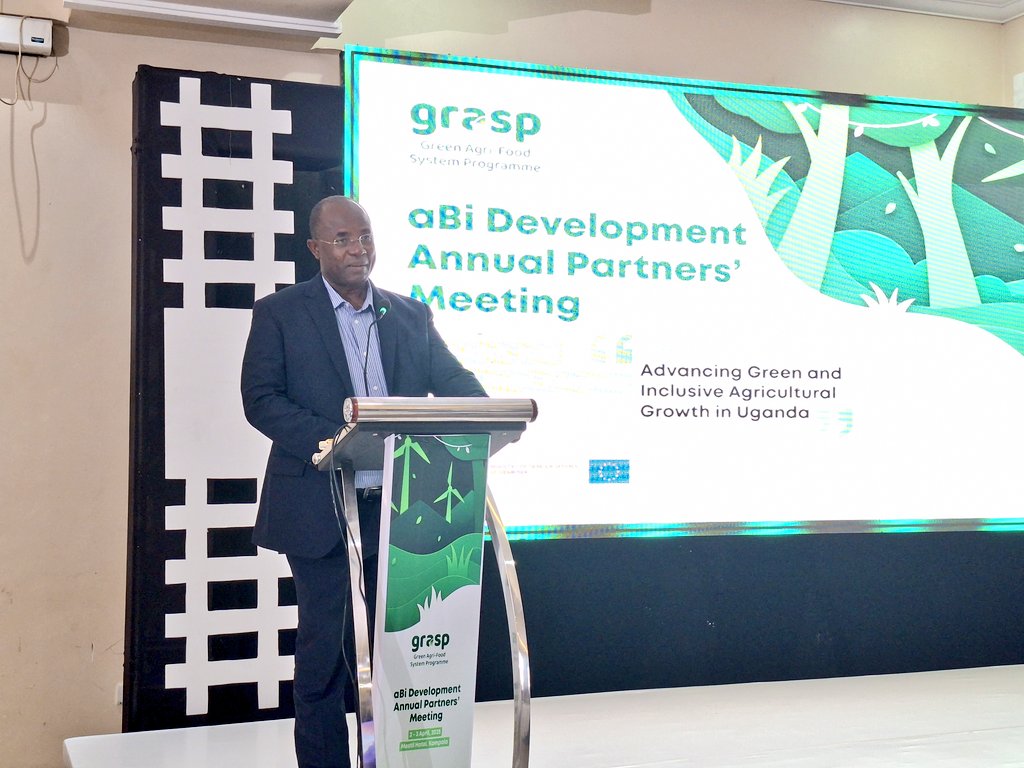 KAMPALA, Uganda – Mr. Fred Bwino Kyakulaga, Uganda’s Minister of State for Agriculture, has underscored the government’s commitment to facilitating the cluster approach within the agribusiness sector —hailing its potential to revolutionize the nation’s agricultural landscape.
KAMPALA, Uganda – Mr. Fred Bwino Kyakulaga, Uganda’s Minister of State for Agriculture, has underscored the government’s commitment to facilitating the cluster approach within the agribusiness sector —hailing its potential to revolutionize the nation’s agricultural landscape.
His remarks came during aBi Development’s inaugural annual partners meeting, where a comprehensive strategy for advancing climate-resilient and inclusive agro-industrial growth was unveiled.
Minister Kyakulaga commended aBi Development and its partners for their proactive role in championing this collaborative model, which he believes is pivotal for addressing the multifaceted challenges confronting Uganda’s agriculture. “We welcome this drive and are excited about its immense potential in transforming the agribusiness sector and the economy,” he stated—highlighting the government’s dedication to supporting such initiatives.

A key focus of his address was the government’s recognition of aBi Development’s efforts in preparing Uganda for compliance with the European Union Deforestation Regulation (EUDR). Minister Kyakulaga acknowledged the collaborative work undertaken by aBi and the private sector in registering and mapping coffee farms, a crucial step in ensuring continued access to the European market.
He specifically highlighted the contract with Royalway Media and PULA mobilise, register and map over 700,000 farms, emphasizing the cluster approach’s effectiveness in bringing together critical actors in the coffee value chain.
“These achievements were realized through a cluster approach, pulling together critical actors in the coffee value chain to address joint sector challenges,” the Minister explained. He extended a call to other partners to join in bringing the clustering initiative to fruition, pledging the government’s continued support for the successful implementation of clusters across various agricultural sectors.
The Minister’s endorsement of the cluster approach was complemented by assurances of continued support from international partners.
Cristina Banuta, Programme Manager for Access to Finance Agri-business and Land at the European Union Delegation to Uganda, speaking on behalf of Ambassador Jan Sadek, reaffirmed the European Union’s commitment to Uganda’s agricultural transformation— with a strong emphasis on sustainable practices.
“Agriculture is not just the backbone of Uganda’s economy; it is the foundation on which millions of lives are built,” Ms. Banuta stated, highlighting the EU’s dedication to ensuring Uganda’s agricultural sector remains competitive and aligned with global market requirements.
Signe Winding Albjerg, the Danish Ambassador to Uganda, further emphasized the importance of sustainable economic development— detailing Denmark’s support for aBi Development’s initiatives aimed at increasing production and productivity through climate-smart solutions.
Moses Nyabila, Chief Executive Officer of aBi Development reported that aBi Development has provided approximately 320 billion Ugandan shillings in grants and technical assistance to over 300 small and medium-sized enterprises (SMEs), farmer organizations, and non-governmental organizations (NGOs) operating within the agricultural sector.
This support, he asserted, has generated an estimated 1.1 trillion Ugandan shillings in additional income for farmers and agribusinesses across Uganda, directly benefiting approximately 11 million individuals.
Mr. Nyabila delineated the organization’s strategic pillars, which are centered on enhancing climate change resilience, fostering green and inclusive growth, and increasing the global competitiveness of Uganda’s agricultural products.
“We are committed to accelerating the transition to green and climate-smart agriculture, pioneering the establishment of agro-industrial zones, and leveraging resources with development partners,” he stated.
aBi Development’s flagship initiatives, as presented by Mr. Nyabila, include the Agricultural Business Centre (ABC), Climate-smart Farm Input Distribution & Services Hubs, Agri-Finance Accelerator/Fund, Off-taker-led Value Chain Hubs, and Digital Farmer Platforms. He further outlined the organization’s investment pipeline, which allocates 10 billion Ugandan shillings to the Tubers, Cereals, Oilseed & Pulses Cluster; 12 billion Ugandan shillings to Horticulture; and 16 billion Ugandan shillings to Coffee.
“Agriculture accounts for 24% of Uganda’s GDP, drives 33% of export earnings, and employs about 70% of the population,” Mr. Nyabila noted. “However, the sector remains largely untapped, with potential for more than three times its current contribution to GDP, export, and manufacturing.”
By 2028, aBi Development aims to reach 2 million farmers with quality inputs and services, double productivity and income levels of 500,000 smallholder farmers, and strengthen agribusinesses and market linkages. The organization has also set its sights on improving food security and rural livelihoods, while promoting climate resilience and environmental sustainability.
Samson Emong, Managing Director of Cafe Africa, addressed the challenges facing the coffee sector in complying with EUDR and the Corporate Sustainability Due Diligence Directive (CS3D), emphasizing the need for collaborative efforts to enhance traceability and compliance.





